
James Minter Knepper was an American jazz trombonist. In addition to his own recordings as leader, Knepper performed and recorded with Charlie Barnet, Woody Herman, Claude Thornhill, Stan Kenton, Benny Goodman, Gil Evans, Thad Jones and Mel Lewis, Toshiko Akiyoshi and Lew Tabackin, and, most famously, Charles Mingus in the late 1950s and early 1960s. Knepper died in 2003 of complications of Parkinson's disease.
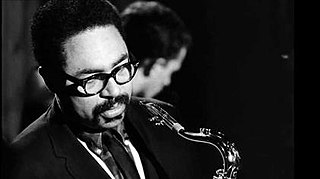
Booker Telleferro Ervin II was an American tenor saxophone player. His tenor playing was characterised by a strong, tough sound and blues/gospel phrasing. He is remembered for his association with bassist Charles Mingus.
Horace Parlan was an American pianist and composer known for working in the hard bop and post-bop styles of jazz. In addition to his work as a bandleader Parlan was known for his contributions to the Charles Mingus recordings Mingus Ah Um and Blues & Roots.

Thaddeus Joseph Jones was an American jazz trumpeter, composer, and bandleader who has been called "one of the all-time greatest jazz trumpet soloists".
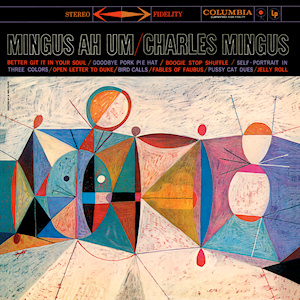
Mingus Ah Um is a studio album by American jazz musician Charles Mingus which was released in October 1959 by Columbia Records. It was his first album recorded for Columbia. The cover features a painting by S. Neil Fujita. The title is a corruption of an imaginary Latin declension. It is common for Latin students to memorize Latin adjectives by first saying the masculine nominative, then the feminine nominative, and finally the neuter nominative singular —implying a transformation of his name, Mingus, Minga, Mingum. The album was inducted into the Grammy Hall of Fame in 2013.
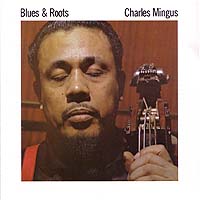
Blues & Roots is an album by Charles Mingus, recorded in 1959 and released on the Atlantic label in 1960. It has been reissued on CD by both Atlantic and Rhino.
James "Osie" Johnson was a jazz drummer, arranger and singer.
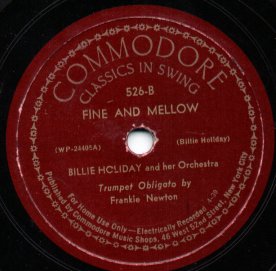
"Fine and Mellow" is a jazz standard written by Billie Holiday, who first recorded it on April 20, 1939 on the Commodore label. It is a blues lamenting the bad treatment of a woman at the hands of "my man".
William Curtis Porter, better known as Shafi Hadi, was an American jazz tenor and alto saxophonist known for his recordings with Charles Mingus and with Hank Mobley.
Henry Coker was an American jazz trombonist.

A Modern Jazz Symposium of Music and Poetry is an album by the jazz bassist, composer, and band leader Charles Mingus, released by Bethlehem Records in mid-1959. In spite of the title, the album does not contain any poetry. "Scenes in the City", however, includes narration performed by Mel Stewart and written by actor Lonne Elder with assistance from Langston Hughes. The composition "Duke's Choice" re-appears, in updated form, as "I X Love" on the 1963 album Mingus Mingus Mingus Mingus Mingus. "Nouroog", "Duke's Choice" and "Slippers" form the basis of the suite "Open Letter to Duke" on Mingus Ah Um.

The Individualism of Gil Evans is an album by pianist, conductor, arranger and composer Gil Evans originally released on the Verve label in 1964. It features Evans' big band arrangements of five original compositions and compositions by Kurt Weill, Bob Dorough, John Lewis and Willie Dixon.
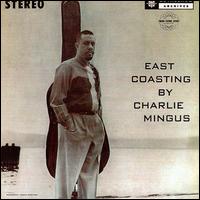
East Coasting is an album by Charles Mingus, recorded and released in late 1957. It was reissued on CD with bonus takes in 1993.

Aretha is the debut studio album by American singer-songwriter Aretha Franklin, released on February 27, 1961, by Columbia Records. It features the Ray Bryant Combo. The album is Aretha's first release for Columbia, and is also known under its working title Right Now It's Aretha. Following in the footsteps of her close friend Sam Cooke, Aretha was "discovered" by famed Columbia Records producer John H. Hammond, who on the liner notes of the 1973 edition of "The Great Aretha Franklin: The First 12 Sides" mentions that she was in fact recommended by the composer Curtis Reginald Lewis. With the support of her father, Reverend C.L. Franklin, Aretha traveled to New York City's Columbia Record Studios to record her debut album for the label. Hammond paired Aretha Franklin with Ray Bryant and arranger J. Leslie McFarland, while taking charge of the album's production, which received mixed reviews.
"The Weary Blues" is a poem by American poet Langston Hughes. Written in 1925, "The Weary Blues" was first published in the Urban League magazine Opportunity. It was awarded the magazine's prize for best poem of the year. The poem was included in Hughes's first book, a collection of poems, also entitled The Weary Blues.

Charles Mingus and Friends in Concert is a live album by the jazz bassist and composer Charles Mingus, recorded at the Philharmonic Hall of the Lincoln Center for the Performing Arts in 1972 and released on the Columbia label. The CD release added five previously unreleased performances from the concert, but did not include the opening track, Fats Waller's "Honeysuckle Rose", present in the LP version and on former Japanese CD editions.
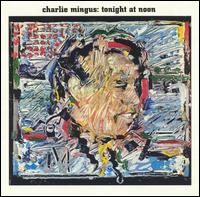
Tonight at Noon is an album by the jazz bassist and composer Charles Mingus, released on the Atlantic label in 1964. It compiles tracks recorded at two sessions – the 1957 sessions for the album entitled The Clown and the 1961 sessions for Oh Yeah but is considered a studio album. These tracks have since been added to the CD re-releases of their respective albums as bonus tracks.

Full Nelson is a jazz album by Oliver Nelson recorded in 1962 and 1963, and released on Verve Records. It is one of his first big band albums. Nelson has also arranged his Hoe Down, originally based on an Aaron Copland composition, which initially appeared in a septet version on The Blues and the Abstract Truth, in a driving big band arrangement that features Clark Terry.
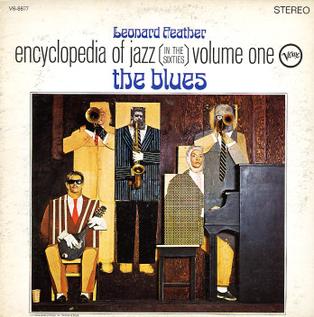
Encyclopedia of Jazz is an album released on the Verve label compiled by jazz journalist Leonard Feather featuring tracks which were recorded to accompany Feather's Encyclopedia of Jazz in the Sixties. The album features three tracks by the Encyclopedia of Jazz All Stars arranged and conducted by Oliver Nelson along with one track each by Jimmy Smith with Wes Montgomery, Count Basie and Johnny Hodges with Earl Hines.















